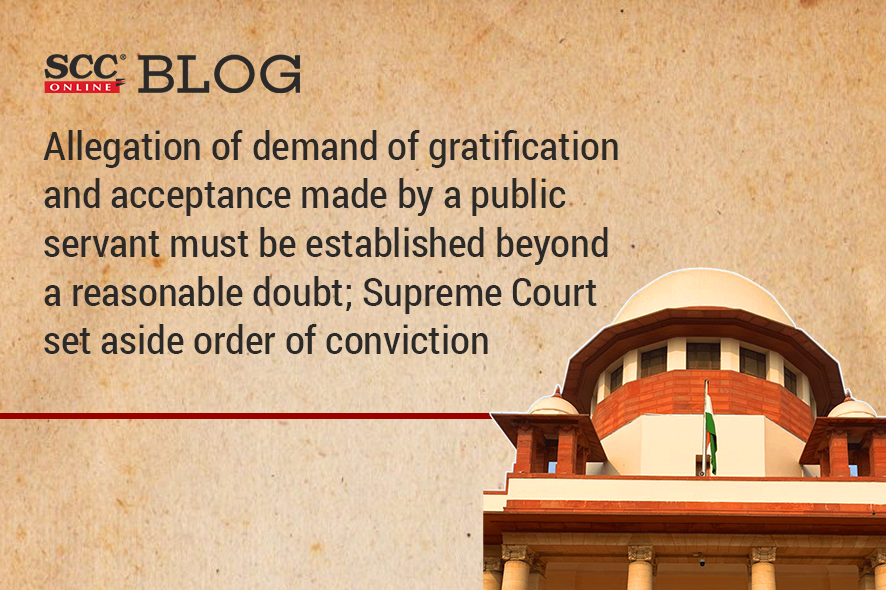Supreme Court: In a criminal appeal filed against order of the Delhi High Court upholding the order of conviction the Special Judge, Delhi, wherein the Court convicted the appellant/convict for the offences punishable under Section 7 and clauses (i) and (ii) of Section 13(1)(d) read with Section 13(2) of the Prevention of Corruption Act, 1988 (‘the PC Act’), the division bench of Abhay S. Oka* and Rajesh Bindal, JJ. reiterated that in absence of direct evidence for offences punished under Prevention of Corruption Act, reliance can be placed on circumstantial evidence to prove demand of gratification and set aside the order of conviction.
Background
The co-accused was convicted by the Special Judge for the offence punishable under Section 12 of the PC Act. The co-accused was acquitted by the High Court and the convict was sentenced to undergo a rigorous imprisonment for a period of three years and to pay a fine of Rs. 15,000/- for offence under Section 13(2) of the PC Act and to undergo rigorous imprisonment for two years and to pay a fine of Rs. 5,000/ for offence under Section 7 of the PC Act.
In the case at hand, the complainant has no electricity meter installed in his shop, therefore, he applied for an electricity meter. Pursuant to the application, a meter was installed in his shop and after a few months, he found that the meter was removed, as the shopkeepers in the area had got the electricity meters installed through the convict. Thereafter, the convict (Inspector in the electricity department in the local area) called the complainant.t her residence to discuss the issue of the electricity meter. She demanded Rs. 15,000/- for getting the meter installed and ultimately after negotiations, she settled the demand at Rs. 10,000/-.
The Special Court held that there was sufficient circumstantial evidence on record to prove the guilt of the convict. The order of conviction by the Special Court has been confirmed by the High Court in the impugned judgment. Thus, the present appeal was filed.
While hearing this appeal, a two-Judge bench of this Court concluded that the decisions in B. Jayaraj v. State of A.P., (2014) 13 SCC 55 and P. Satyanarayana Murthy v. State of A.P., (2015) 10 SCC 152 conflicted with an earlier three-Judge bench’s decision in the case of M. Narsinga Rao v. State of A.P., (2001) 1 SCC 691. Further, the question that “whether in the absence of evidence of complainant/direct or primary evidence of demand of illegal gratification, is it not permissible to draw inferential deduction of culpability/guilt of a public servant under Section 7 and Section 13(1)(d) read with Section 13(2) of PC Act, 1988 based on other evidence adduce by the prosecution.” was referred for decision to a Constitution Bench, which held that in absence of the complaint’s testimony in a prosecution for offences punishable under Sections 7 and 13(2) of the PC Act, the prosecution can rely upon even circumstantial evidence to prove the demand of gratification. The Constitution Bench has approved the above-mentioned decisions.
Issue: Whether there is any direct evidence of demand, if not then whether there is any circumstantial evidence to prove the demand?
Analysis
The Court took note of Sections 7 and 13 of the PC Act and the aforesaid decision of the Constitution bench, and said that even the issue of presumption under Section 20 of the PC Act has been answered by the Constitution Bench by holding that only on proof of the facts in issue, Section 20 mandates the Court to raise a presumption that illegal gratification was for the purpose of motive or reward as mentioned in Section 7.
Further, it said that the presumption under Section 20 can be invoked only when the two basic facts required to be proved under Section 7, are proved. Once the basic facts of the demand of illegal gratification and acceptance thereof are proved, unless the contrary is proved, the Court will have to presume that the gratification was demanded and accepted as a motive or reward as contemplated by Section 7. However, this presumption is rebuttable.
Placing reliance on N. Vijayakumar v. State of T.N., (2021) 3 SCC 687, the Court said that the demand for gratification and its acceptance must be proved beyond a reasonable doubt.
Further, it concluded that in absence of direct evidence, the demand and/or acceptance can always be proved by other evidence such as circumstantial evidence. The allegation of demand of gratification and acceptance made by a public servant has to be established beyond a reasonable doubt, and the decision of the Constitution Bench does not dilute this elementary requirement of proof beyond a reasonable doubt.
The Court said that there are no circumstances brought on record which will prove the demand for gratification. Therefore, it was held that the ingredients of the offence under Section 7 of the PC Act were not established and consequently, the offence under Section 13(1)(d) will not be attracted.
[Neeraj Dutta v. State (NCT of Delhi), 2023 SCC OnLine SC 280, decided on 17-03-2023]
*Judgment by: Justice Abhay S. Oka






